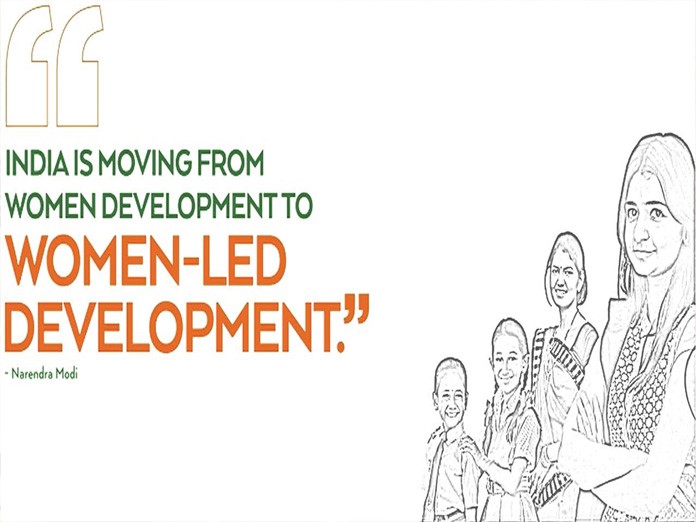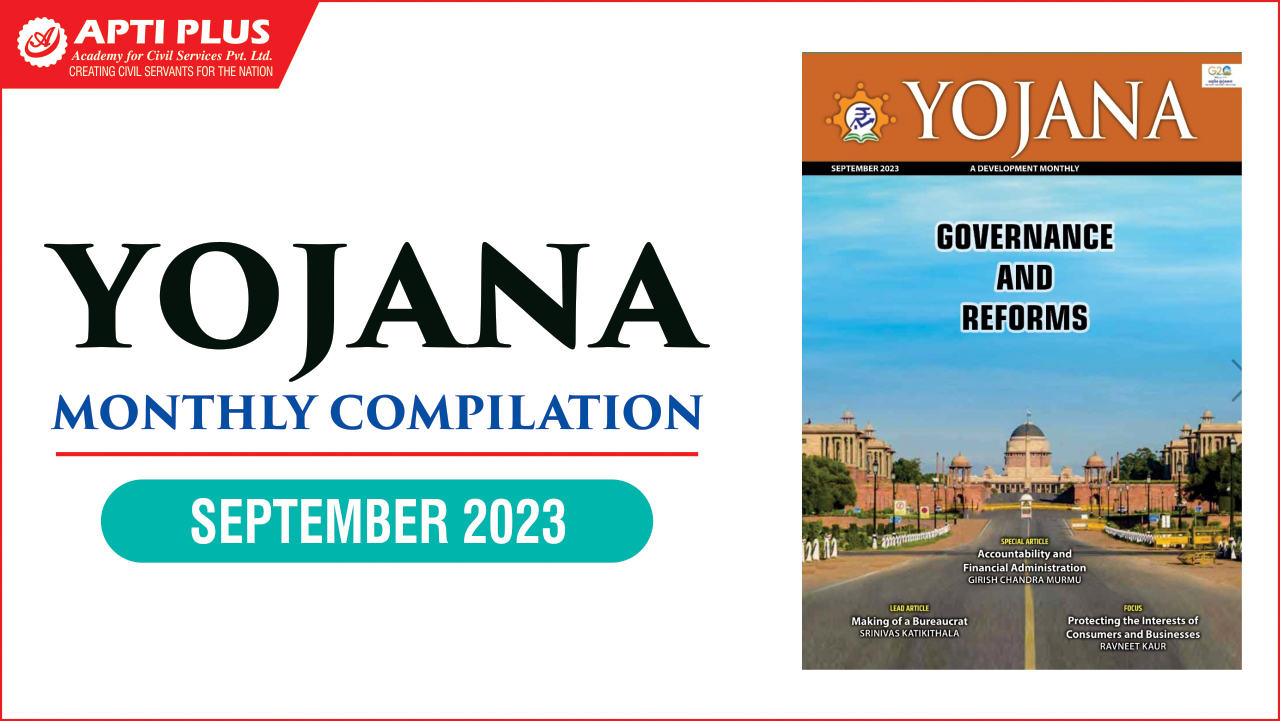PERSPECTIVE: WOMEN-LED DEVELOPMENT

Disclaimer: Copyright infringement not intended.
Context
- Women-led development has been one of the key priorities of India’s G20 presidency.
Details:
- With the belief that when women prosper, the world prospers, India adopted an approach to mainstream gender into G20 discussion recommending urgent action to mitigate gender inequalities, adopting a sector-specific approach to target and improve female workforce participation, and unlock the potential of finance in advancing the women-led development agenda.
- At the G20 Summit, leaders reaffirmed that gender equality is of fundamental importance, and that investing in the empowerment of all women and girls, has a multiplier effect in implementing the 2030 Agenda.
INTRODUCTION:
- Women play an integral part in society; without their progress, the overall progress of society comes to a halt. Societies in which women see consistent growth have been known to prosper themselves. It is through the empowerment of women that societies can ensure their growth as well.
- The Government of India has been focused on promoting “Nari Shakti” in the country. It is committed to improve women’s lives in the country and remove any bottlenecks that come in the way of their development.
- Women’s economic empowerment is at the heart of India’s G20 agenda. Exploring the potential of gender transformative approaches, this intergovernmental forum of the G20 promises a platform for members to collectively translate ideas into tangible outcomes aimed at achieving substantive and sustained gender equality.
|
From financial inclusion to social security, quality healthcare to housing, education to entrepreneurship, many efforts have been made to put our Nari Shakti at the forefront of India’s development journey. These efforts will continue with even greater vigour in the coming times.
|

India’s Vision:
- India’s vision is well encapsulated in our Hon’ble Prime Minister Narendra Modi’s remark at the G20 Summit in Bali, “global development is not possible without women’s participation.”
- There is substantial evidence to support that with increased internet and mobile penetration, female entrepreneurship has scaled substantially in India.
- With an estimated 13.5 million to 15.7 million MSMEs and agribusinesses, India has more women-owned enterprises compared to many other countries.
- In addition to job creation by private and government sectors, entrepreneurship is a powerful yet largely untapped opportunity for working-aged women in India.
- By creating jobs, fuelling innovation and advancing investments in health and education, entrepreneurship among women can help transform India’s journey towards social and economic growth.
| According to a McKinsey report, India can add up to 18% to its GDP (approximately $ 770 billion), provided it bridges its gender equality gap by improving female workforce participation in the country. |
For India to achieve SDG 5:
- Gender Equality, the Indian Government has taken extraordinary measures including Stand-Up India, PM MUDRA Yojana, Beti Bachao Beti Padhao, POSHAN Abhiyaan, increasing the scope of entrepreneurship among women.
- Self-Help Groups have helped boost women’s skills and promote women led entrepreneurs. Financial inclusion schemes, such as the Pradhan Mantri Jan Dhan Yojana (PMJDY), have addressed one of the primary challenges faced by women led businesses—credit gaps and provided access to financial services such as savings accounts, need-based lending, remittances services, insurance, and pensions.
- Since then, over 460 million bank accounts have been established, with 56 percent being owned by women.
- Between 2015 and 2022, the average deposit into PMJDY accounts climbed by over three times, from INR 1,279 to INR 3,761.
- In a similar vein, the Udyam Sakhi portal is effectively disseminating information regarding Government schemes, policies and activities for women entrepreneurs, thus promoting financial inclusion.
| Around 8.59 lakh women-led MSMEs registered in FY22 (up to March 28, 2022) in comparison to 4.9 lakh registrations in FY21 |
Inclusive growth and development:
- India’s leadership is primed to prioritize inclusive growth and development, with women’s representation and empowerment at the center of India's G20 deliberations.
- Women20 (W20), the official G20 engagement group, is dedicated to embedding gender considerations into policies and commitments that promote gender parity.
- The mandate falls in alignment with India's national priorities and Maharashtra’s Aurangabad is set to host the first inception meet of W20 India on February 13-14, 2023.
- The first Global Partnership for financial inclusion meeting for G20 was recently held in Kolkata and showcased India as a leading example of digital financial inclusion. During the conference, Tribal Affairs’ Minister, Arjun Munda emphasized the shift from women's development to women-led development throughout the world.
- Highlighting this, he remarked that financial inclusion can be leveraged as a tool to advance financial empowerment and self-reliance for women.
Opportunities:
- Amplifying the distribution of opportunities, resources, and choices for women, nations have embarked upon the journey to provide these key drivers of development with improved access to basic amenities, focused investments in employment and skill development, and gender inclusive policies.
- Moving forward, the W20 Engagement group will focus on priority areas that will include Women’s Entrepreneurship, Grassroot Women Leadership, Bridging the Gender Digital Divide, Education & Skill Development, and Climate Change.
- Additionally, addressing normative constraints faced by women is a core lever essential to catalyze meaningful change. The inclusion of all development actors is a critical driver of India’s G20 presidency.
Visionary zeal:
- With a visionary zeal to enable women and foster change at the grassroots, the W20 is accommodating key stakeholders in the conversation from tribal and rural areas, agriculture, handloom & handicrafts sector, micro & nano enterprises, SHGs, Anganwadis, along with adolescent girls, women living in urban slums and homemakers to ensure intersectional representation.
Challenges in Women-led Development in India:
Gender Inequality:
- Deep-rooted gender norms and stereotypes persist in Indian society, limiting women's access to education, employment, and decision-making roles. Gender inequality remains a major obstacle to women-led development.
Limited Access to Education:
- In some parts of India, particularly in rural areas, girls still face challenges in accessing quality education. This lack of education can hinder women's ability to participate in and lead development initiatives.
Economic Disparities:
- Women often face economic disparities, including unequal pay for equal work and limited access to economic resources. This economic inequality can undermine the ability of women to lead and sustain development projects.
Cultural and Social Norms:
- Traditional cultural and social norms can constrain women's roles and limit their autonomy. This can affect their ability to take on leadership roles and contribute to decision-making processes in development initiatives.
Limited Access to Healthcare:
- In some areas, women face challenges in accessing adequate healthcare, impacting their overall well-being and their ability to actively participate in development activities.
Violence Against Women:
- Gender-based violence remains a pervasive issue in India. The fear of violence can restrict women's freedom of movement and their ability to engage in development initiatives without fear of reprisal.
Lack of Representation:
- Women are often underrepresented in leadership and decision-making positions in various sectors, including politics and business. This lack of representation hampers the integration of a gender-sensitive approach in development policies and programs.
.jpg)
Significance of Women-led Development in India:
Gender Equality and Social Justice:
- Empowering women contributes to the promotion of gender equality and social justice. It challenges traditional gender roles and stereotypes, fostering a more inclusive and equitable society.
Economic Growth:
- Women constitute a significant portion of the population, and their active participation in the workforce is essential for sustained economic growth. Women-led development can lead to increased productivity, innovation, and overall economic development.
Education and Skill Development:
- Investing in women's education and skill development is crucial. When women are educated and skilled, they are better positioned to contribute to the workforce, make informed decisions, and positively impact their communities.
Health and Well-being:
- Women often play a central role in family health and well-being. Women-led development can lead to improved healthcare outcomes, as empowered women are more likely to prioritize and advocate for the health needs of their families.
Community Development:
- Women are often key agents of change at the community level. When women are actively involved in decision-making processes, community development initiatives tend to be more holistic and sustainable.
Political Participation and Representation:
- Women-led development contributes to increased political participation and representation of women in governance. This is essential for addressing gender-specific issues and ensuring that policies are more inclusive and responsive to the needs of women.
Empowerment of Future Generations:
- When women are empowered, it has a positive ripple effect on future generations. Educated and empowered women are more likely to invest in the education and well-being of their children, breaking the cycle of poverty and inequality.

Conclusion
- Thus, India’s G20 presidency is going to play a pivotal role in driving collaboration and giving further impetus to women’s economic empowerment. This will be an opportune time for India to shed light on best practices adopted by countries for gender mainstreaming and act as a game changer in fostering women’s economic growth in India
CITATIONS:
https://sansadtv.nic.in/show/perspective
https://www.investindia.gov.in/team-india-blogs/women-led-development-indias-opportunity-g20
https://www.smsfoundation.org/shift-from-womens-development-to-women-led-development-in-india/
https://static.pib.gov.in/WriteReadData/specificdocs/documents/2022/oct/doc2022103113501.pdf
https://transformingindia.mygov.in/women-led-development/
https://www.iasgyan.in/ig-uploads/pdf/rstv18.pdf




